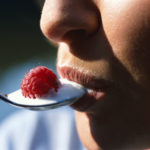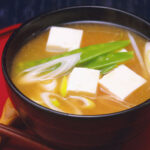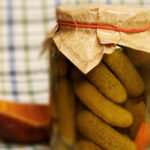 Probiotics are amazingly healing to the gut. If you can not get them in food, it is a good idea to consider supplementing with a high potency probiotic.
Probiotics are amazingly healing to the gut. If you can not get them in food, it is a good idea to consider supplementing with a high potency probiotic.
Yogurt: Probiotics Source Yogurt is the most familiar source of probiotics — “good” bacteria like lactobacillus or bifidobacteria that keep a healthy balance in your gut. Studies suggest that probiotics can help ease lactose intolerance. They also may help tame gas, diarrhea, and other digestive problems. You can pay extra for special digestive yogurt brands, but any with “live and active cultures” listed may help.
Sauerkraut Boosts Digestion Sauerkraut (fermented cabbage) contains the beneficial microbes leuconostoc, pediococcus, and lactobacillus. Choose unpasteurized sauerkraut because pasteurization (used to treat most supermarket sauerkraut) kills active, beneficial bacteria. Sauerkraut — and the similar but spicy Korean dish, kimchi — is also loaded with immune-boosting vitamins that may help ward off infection.
 Miso Soup for Active Digestion A popular breakfast food in Japan, this fermented soybean paste really can get your digestive system moving. Probiotic-filled miso reportedly contains more than 160 bacteria strains. It’s often used to make a salty soup that is low in calories and high in B vitamins and protective antioxidants
Miso Soup for Active Digestion A popular breakfast food in Japan, this fermented soybean paste really can get your digestive system moving. Probiotic-filled miso reportedly contains more than 160 bacteria strains. It’s often used to make a salty soup that is low in calories and high in B vitamins and protective antioxidants
Soft Cheeses Fight Bacteria While potentially good for your digestion, not all probiotics can survive the journey through your gastrointestinal tract. But research finds the lactobacillus strains in some fermented soft cheeses, like Gouda, are hardy enough to survive. In addition, cheese may act as a carrier for probiotics which may, in turn, boost the immune system.
Kefir: Probiotic-Filled Drink According to legend, kefir dates back to the shepherds of Eurasia’s Caucasus Mountains. They discovered that the milk they carried had a tendency to ferment into a bubbly beverage. Thick, creamy, and tangy like yogurt, kefir has its own strains of probiotic bacteria, plus a few beneficial yeast varieties.
Sourdough Bread Aids Digestion The next time you make a sandwich, pay attention to what’s holding your cold cuts and cheese. San Francisco’s famous sourdough bread contains lactobacilli, a probiotic which may benefit digestion.
Milk With Probiotics One of the easiest ways to get probiotics into your diet is by adding acidophilus milk. This is simply milk that has been fermented with bacteria such as lactobacillus acidophilus. Sometimes it’s labeled sweet acidophilus milk. Buttermilk — generally milk that is cultured with lactic acid bacteria — is also rich in probiotics.
 Probiotics in Sour Pickles When looking to pickles for probiotics, opt for naturally fermented varieties where vinegar wasn’t used in the pickling process. A sea salt and water solution encourages the growth of beneficial bacteria and may give sour pickles some digestive benefits.
Probiotics in Sour Pickles When looking to pickles for probiotics, opt for naturally fermented varieties where vinegar wasn’t used in the pickling process. A sea salt and water solution encourages the growth of beneficial bacteria and may give sour pickles some digestive benefits.
ry Tempeh for Probiotics Made from a base of fermented soybeans, this Indonesian patty produces a type of natural antibiotic that fights certain bacteria. In addition, tempeh is very high in protein. Its flavor has often been described as smoky, nutty, and similar to a mushroom. Tempeh can be marinated and used in meals in place of meat.
Probiotic Supplements In addition to being found in foods, probiotics are available as supplements in capsule, tablet, powder, and liquid form. Although they don’t provide the additional nutritional value that foods can offer, they can be convenient. If you’re interested, talk to your doctor. If you’re acutely ill or have immune system problems, you may want to be cautious about consuming probiotics.
Prebiotics vs. Probiotics While probiotic-foods contain live bacteria, prebiotic foods feed the good bacteria already living in your digestive system. You can find prebiotics in foods such as asparagus, Jerusalem artichokes, bananas, oatmeal, red wine, honey, maple syrup, and legumes. Consider eating prebiotic foods on their own or with probiotic foods to perhaps give the probiotics a boost.
I was very pleased to find this website.
I need to to thank you for your time for this particularly wonderful read!!
I definitely appreciated every part of it and i also have you
bookmarked to look at new information in your web site.
Thank you Nina,
There are so many ways we can take care of ourselves and this is one way to do it.